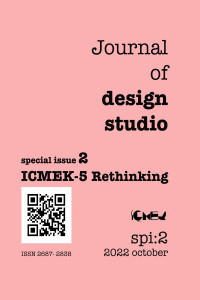Examining Workshops in the Intersection of Formal and Informal Architecture Education: The Case of “Bahar Atölyeleri”
Examining Workshops in the Intersection of Formal and Informal Architecture Education: The Case of “Bahar Atölyeleri”
___
- Avcı, O. (2019). Enformel Eğitimin Formelliği Üzerine. Betonart, 63, 30-33.
- Bartkus, K. R., Nemelka, B., Nemelka, M., & Gardner, P. (2012). Clarifying The Meaning of Extracurricular Activity: A Literature Review of Definitions. American Journal of Business Education, 5(6), 693. doi: 10.19030/ajbe.v5i6.7391
- Brooks-Harris, J. E., Stock-Ward, S. R. (1999). Workshops: Designing and Facilitating Experiential Learning. SAGE Publications Ltd.: Thousand Oaks, CA, USA.
- Chuang, S. (2021). The Applications of Constructivist Learning Theory and Social Learning Theory on Adult Continuous Development. Performance Improvement, 60(3), 6–14. doi:10.1002/pfi.21963
- Ciravoğlu, A. (2003). Mimari Tasarım Eğitiminde Formel ve Enformel Çalışmalar Üzerine. Yapı Dergisi, 257, 43-47.
- Ciravoğlu, A. (2019). Mimarlık Eğitiminin İçi-Dışı… In G.Özorhon, G. Sarman, I. Bayraktar (Eds.), +10 İstanbul Araştırma Çalıştayları 2019, (pp. 17-23). Istanbul, Ozyegin University Publication.
- Coombs, P. H. & Ahmed, M. (1980). Attacking Rural Poverty: How Noriformal Education Can Help. Baltimore: Johns Hopkins University Press.
- Hacihasanoglu, O. (2022). +10 İstanbul Research Workshops 2019. Journal of Design Studio, 4 (1) , 113-115 . doi: 10.46474/jds.1139785
- La Bella, T. J. (1976). Nonformal Education and Social Change in Latin America. Los Angeles: UCLA Latin American Center.
- La Bella, T. J. (1982). Formal, Nonformal and Informal Education: A Holistic Perspective on Lifelong Learning. Los Angeles: UCLA Latin American Center.
- Milovanović, A., Kostić, M., Zorić, A., Đorđević, A., Pešić, M., Bugarski, J., Todorović, D., Sokolović, N. & Josifovski, A. (2020). Transferring COVID-19 challenges into learning potentials: online workshops in architectural education. Sustainability, 12(17), 7024. doi: 10.3390/su12177024
- Roulin, N., Bangerter, A. (2013). Students’ Use of Extra-curricular Activities for Positional Advantage in Competitive Job Markets. Journal of Education and Work, 26(1), 21-47. doi: 10.1080/13639080.2011.623122
- Ruohui, L. (2016). The Exploration of Modes for College Design Workshops Based on Cloud Platform. In J. E. Guerrero (Ed.), In 2016 Eighth International Conference on Measuring Technology and Mechatronics Automation (pp. 778-781). doi: 10.1109/ICMTMA.2016.189
- Schenkman, A. S. (1955). The Workshop Idea Exported. The Journal of Higher Education, 26(6), 305-341.
- URL-1, Bahar Atölyeleri (2021, 02, 05). Retrieved 08, 18, 2022, Retrieved from https://icmim.iku.edu.tr/tr/haberler/2021-bahar-atolyeleri
- Yanpar, Z., D. (2018). The Relation Between Extracurricular Design Workshops and The Educational and Professional Developments of Industrial Design Students [Unpublished master thesis). Middle East Technical University.
- Yürekli, İ., Yürekli, H. (2004). Mimari Tasarım Eğitiminde Enformellik. İTÜ Dergisi/a, 3(1), 53-62.
- Yayın Aralığı: Yılda 2 Sayı
- Başlangıç: 2019
- Yayıncı: Orhan HACIHASANOĞLU
A Case Study on Online Design Workshop Experience: Gamification and Space
Derya KARADAĞ, Simge GÜLBAHAR, Betül OZAR
Gülay USTA, Armağan Seçil MELİKOĞLU EKE, Özge ILIK SALTIK
Gizem ÇORLULUOĞLU, Ahmet Fatih KARAKAYA
Furkan EVLİYAOĞLU, Koray GELMEZ
